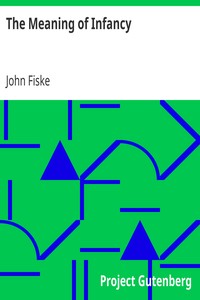The Meaning of Infancy by John Fiske
"The Meaning of Infancy" by John Fiske is a scientific publication written in the late 19th century. This work delves into the developmental significance of infancy and its crucial role in human evolution, linking biology and education in a thoughtful exploration of childhood's importance in shaping humanity. Fiske's analysis not only outlines the biological and psychological implications of a prolonged infancy but also emphasizes the social dimensions emerging from this phase of
life. In this book, Fiske argues that the lengthening of infancy among humans compared to other animals is pivotal to understanding our species' capacity for progress and civilization. He articulates how this extended period of helplessness fosters educational opportunities and shapes social structures, particularly family dynamics. By examining the evolutionary context, he posits that the dependence of infants on their caregivers has led to permanent familial bonds and the formation of society. He further suggests that the unique characteristics of human infancy—its plasticity and educability—are what allow for the accumulation of knowledge and morality over generations, ultimately positioning humanity as the culmination of a long evolutionary process. (This is an automatically generated summary.)
Read now or download (free!)
| Choose how to read this book | Url | Size | ||||
|---|---|---|---|---|---|---|
| Read online (web) | https://www.gutenberg.org/ebooks/12359.html.images | 81 kB | ||||
| EPUB3 (E-readers incl. Send-to-Kindle) | https://www.gutenberg.org/ebooks/12359.epub3.images | 96 kB | ||||
| EPUB (no images, older E-readers) | https://www.gutenberg.org/ebooks/12359.epub.noimages | 95 kB | ||||
| Kindle | https://www.gutenberg.org/ebooks/12359.kf8.images | 211 kB | ||||
| older Kindles | https://www.gutenberg.org/ebooks/12359.kindle.images | 202 kB | ||||
| Plain Text UTF-8 | https://www.gutenberg.org/ebooks/12359.txt.utf-8 | 72 kB | ||||
| Download HTML (zip) | https://www.gutenberg.org/cache/epub/12359/pg12359-h.zip | 96 kB | ||||
| There may be more files related to this item. | ||||||
Similar Books
About this eBook
| Author | Fiske, John, 1842-1901 |
|---|---|
| Title | The Meaning of Infancy |
| Note | Reading ease score: 49.3 (College-level). Difficult to read. |
| Contents | I. The meaning of infancy. From "Excursions of an evolutionist" -- II. The part played by infancy in the evolution of man. From "A century of science". |
| Credits | Produced by Al Haines |
| Language | English |
| LoC Class | QH: Science: Natural history |
| Subject | Human evolution |
| Subject | Infants |
| Category | Text |
| EBook-No. | 12359 |
| Release Date | May 1, 2004 |
| Most Recently Updated | Dec 14, 2020 |
| Copyright Status | Public domain in the USA. |
| Downloads | 74 downloads in the last 30 days. |
| Project Gutenberg eBooks are always free! | |

